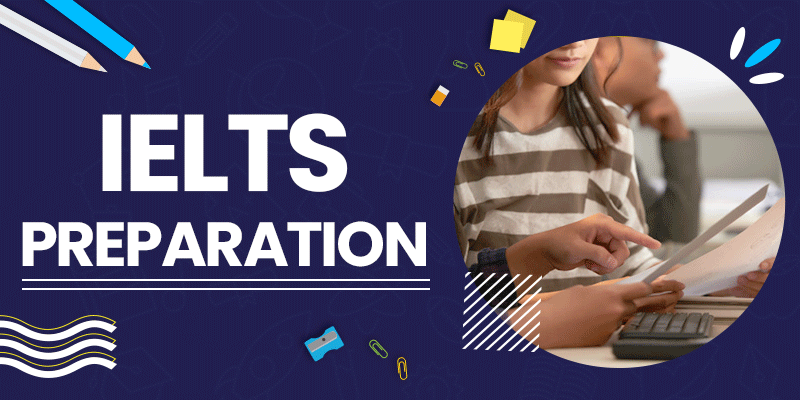An insight into IELTS…
Before moving toward the tricks to decoding the IELTS exam, let’s understand the components of the former.
IELTS is a short form of International English Language Testing Systems.
IELTS test incorporates four sub-modules. Namely, Listening, Reading, Writing, and Speaking.
To begin with the Listening module, you need to understand that, there is a slight difference between paper-based IELTS & computer-based IELTS.
In the computer-delivered IELTS test, if we talk about the listening section, the test taker has to select from the drop-down options, therefore he/she doesn’t get extra 10 minutes for transferring answers, as in the case of paper-based IELTS.
In general, the listening exam can be subsumed into 4 sub-sections.
These sections are built up of 10 questions in each section, totaling 40 questions in the listening section of IELTS.
Moving further, now let’s give the limelight to the reading module of the IELTS exam Preparation Tips.
The reading module of the IELTS exam is made up of 40 questions, these questions are scattered among 3 to 4 passages.
There are varied types of questions asked in the reading module, ranging from true/false/not given to match the headings.
Sometimes there are more educational essays and sometimes there are fictional essays in the reading module.
Furthering the discussion, let’s talk about the writing module now.
The IELTS writing test is divided into task1 & task 2.
Writing task 1 is different for general IELTS and academic IELTS. The aspirants appearing for the former need to write a letter, which may be formal, informal, or semi-formal.
Moving towards the academic IELTS, the test takers are required to write a report based on their observations of a graphical representation, such as a bar diagram, histogram, pie chart, table graph, etc.
Moving further, task 2 of the writing module comprises the essay writing in 300 words on a random topic which can be related to the environment, health, technology, crime, education, law & order, parenting, entertainment, etc.
In writing task 2 there are 7 different categories of questions out of which any 1 can come. There is no choice given to select the questions.
Here is a very important point to be noted, the IELTS test is split into 2 days. On day 1 you will have your listening, reading, and writing test and the speaking test happens 4 to 5 days preceding or after the LWR exam date.
Let’s not forget that the speaking module involves 3 sub-parts.
Starting with the interview round, this lasts for approximately 4-5 minutes. In this test, the examiner asks general questions about the candidate
To exemplify, the questions can pertain to his/her hometown, interests in music, likings for food or restaurants, etc.
After responding to part 1 questions, the test taker is given a piece of paper and a pen to prepare for task 2.
This is called Cue Card round. The cue card is having a random question that can be related to your experiences and can be asking your viewpoints about the topic at hand.
While moving towards the end of the speaking test, the last section is the follow-up round.
In the follow-up round, the individuals are required to answer 10-12 questions, the context of the question is related to the topic of the cue card.
Now as you may have understood the exam pattern and technicalities involved in the IELTS exam, let us understand different tricks to score good bands in all the 4 modules of the test.
Though there are a lot of centers for Affordable IELTS coaching in Ghaziabad, very few provide transparent tricks for the higher bands.
Let us look into some genuine tricks for cracking IELTS….

Tricks & tips for the Listening exam….
- Never write directly on the answer sheet, it is very risky, always scribble your answers on the answer sheet, and then after the completion of the test, transfer the answers in the given time to the answer sheet.
- Always listen carefully, you cannot afford to lose focus, as this may cause confusion and you may skip a few questions in the process of regaining your attention back.
- Try to attempt all the given questions.
- As there is no negative marking, leaving any question can be a foolish decision.
- Look out for the synonyms of the keywords in the audio.
- The audio in the listening exam is never repeated, so try to make a flow chart or a story so that it is easier to refer to in case of any confusion.
Tips & tricks for the reading module….
- Never start your reading test by reading the passage, you do not have to read the passage at all.
- Only look for the keywords in the question statement first, then locate the same in the passage.
- The reading test is a bit confusing, as there can be trick questions too, these are to be dealt with carefully as the examiner can trick you by using, similar-sounding words.
Tips & tricks for the writing module….
- The first rule to writing any of the writing tasks, be it 1 or 2, is to understand the question, before starting to write anything.
- After understanding the question, circle the keywords.
- After pondering upon the keywords, decide your favorable side of the argument before beginning to write.
- The next step after jotting down the argument is to write down at least 6-8 related vocabularies.
- While you write the tasks, it is advisable to attempt writing task2 before writing the task1 as it will be easier to do task 1 in 15 minutes, but you cannot write a 300 words essay in 30 minutes.
- Never miss rechecking your writing task, while you are rechecking, scrutinize the essay very carefully and observe what mistakes are done.
- Linkers are to be included in the writing task, as the linkers allow for the connection of different paragraphs written in the writing tasks.
Tips & Tricks for speaking module….
- If you wish to achieve more than 7.5 bands in your speaking task, always remember, it’s not the content that matters, rather, it’s the confidence with which it is delivered.
- The cue card section holds 50% of the weightage of the marks of the speaking score. Therefore, practice as many cue cards as you can.
- Try to record yourself and become your scrutinizer.
- The major areas to be focused on are the level of fluency and the number of novel words to be included in your spoken task.
- Always remember, do not waste your preparation time given before the cue card round, and utilize it to the fullest in writing the ideas and vocabulary to be included in the task.
Read More – IELTS Writing Task 2: Top Band 9 Essay Topics with Answers
For more such IELTS exam tips and tricks visit Jaivik Overseas consultants, Ghaziabad, it is one of the best IELTS coaching institutes in India
You can meet your personal IELTS trainer, who can mentor you to achieve great bands in your IELTS EXAM.
Jaivik overseas consultants provides online as well as offline coaching for IELTS, with this IELTS coaching in Ghaziabad, Delhi as well as in the adjacent cities is now an easy reach for every aspirant.


